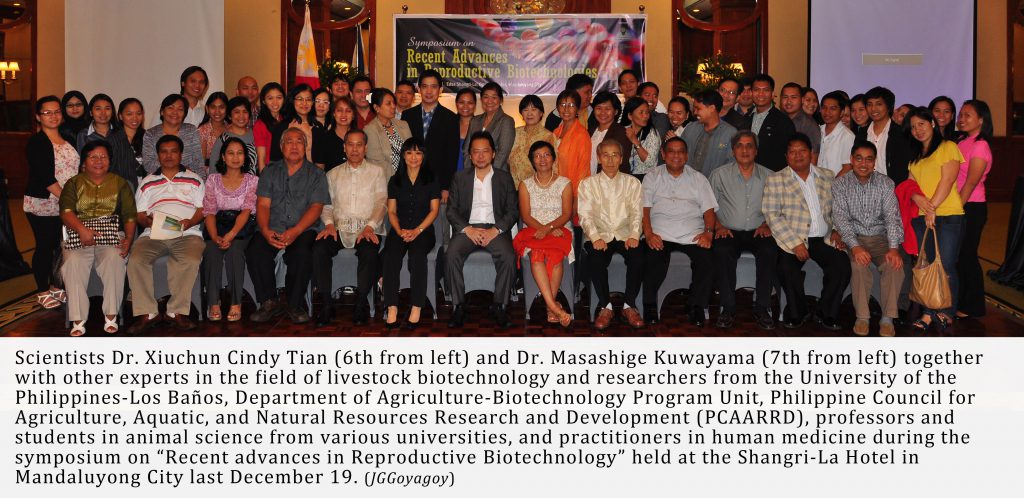Two internationally renowned scientists were recently engaged by the Philippine Carabao Center (PCC) for technical consultancy in PCC’s livestock reproductive biotechnology program and other related research collaborations.
The scientists were Dr. Masashige Kuwayama and Dr. Xiuchun Cindy Tian.
Dr. Masashige Kuwayama is the chief executive officer of the Reproductive-Support Medical Research Center and the director of the Kato Ladies Clinic in Tokyo, Japan. Dr. Xiuchun Cindy Tian, on the other hand, is a professor in the Animal Science Department and Center for Regenerative Biology in the University of Connecticut, USA.
Dr. Kuwayama also gave a hands-on training among PCC scientists at the PCC Reproductive laboratory on his vitrification method using Cryotec, his most recent modification of the Cryotop method.
A component of the technical consultation was a symposium on reproductive and molecular biotechnology held on December 19 at the Edsa Shangri-La Manila hotel in Mandaluyong City. This symposium was attended by experts in the field of livestock biotechnology and researchers from the University of the Philippines-Los Baños, Department of Agriculture-Biotechnology Program Unit, and from the Philippine Council for Agriculture, Aquatic, and Natural Resources Research and Development (PCAARRD). Professors and students in animal science from various universities, and practitioners in human medicine also attended the event.
Dr. Kuwayama presented his topic on “successful vitrification of oocytes and embryos in human and animals” which highlighted his team’s efforts in successfully vitrifying human oocytes and embryos particularly of infertile and cancer patients using the Cryotop vitrification method. Cryotop is a vitrification method which Dr. Kuwayama developed for human oocytes in 1999 and human embryos in 2000. With the same method, he established the first human cryobank in 2001.
“Clinically optimized vitrification protocol has been established in this decade and extremely preferable results have been repeatedly reported for human oocytes and embryos in many advanced IVF (in-vitro fertilization) centers in Japan, USA, and Europe,” Dr. Kuwayama said.
“I wish that the success of this technology can create significant impact around the world not only for the benefits of the common infertile patients, but also for cancer women to realize their dream of fertility. I hope that this technology can contribute widely among humans as well as in the animal industry of the Philippines,” he added.
Dr. Tian, on the other hand, presented the topic “functional genomics in early bovine embryos from assisted reproductive biotechnologies” and on the importance of the use of somatic cell nuclear transfer (SCNT) or cloning in animals.
Recognizing that various animals such as sheep, cattle, goat, pig, buffalo, among others, have been cloned successfully, she said that introduction of this advanced technology on reproduction might not be fully embraced by the public due to fear, misunderstanding, and ethical concerns.
“Technology, however, is continuously evolving to improve production efficiency, generate good quality products, and address the rapidly increasing human population,” Dr. Tian said.
She further explained that by 2050, there would be 10 billion people and there would not be enough food for everyone. This, she said, calls scientists to develop technologies that could ensure production efficiency and food sufficiency.
“Some of these technologies are already here. What we need to do now is to make people understand them better,” she said.
PCC executive director Dr. Libertado Cruz, on the other hand, said: “When we see the progress of these animal biotechniques, such as artificial insemination (AI), super ovulation, nuclear transfer, and IVM/IVF (in-vitro maturation/in-vitro fertilization), we realize that these are becoming more practical. Same thing goes with somatic cell nuclear transfer.”
“With continuous efforts on improving the efficiency of this technology, perhaps SCNT will become a practical technology in the farm 10 to 20 years from now,” Dr. Tian seconded.
With the consultancy engagement of the two experts, PCC positively looks forward to a strengthened PCC reproductive biotechnology unit in the areas of oocyte and embryo cryopreservation; genomics/genetic researches; and establish international linkages through research collaborations along the areas of cryopreservation and molecular reproduction.

